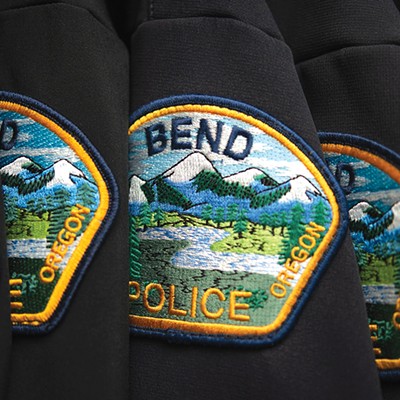You probably didn't hear much about it during the local, regional and national television election night coverage and it's likely that you only caught a brief news story about it in the days that followed, but Measure 74, the Oregon voter initiative that would have created a state-regulated medical marijuana dispensary system, did not pass. Also, in California, Proposition 19, which would have made small amounts of marijuana legal in the state, was voted down. In the middle of the NBC News election coverage, Brian Williams, still on camera at near 1 a.m. in New York City and appearing a bit fatigued, only jokingly commented on Prop. 19's failure when the returns came in. With the sweeping Congressional wins by Republicans, the din surrounding all things Tea Party and the remarkably contentious and ultimately close gubernatorial race here in Oregon, pot didn't make the sort of waves that grabbed headlines.
Yet, for medical marijuana users, anti-prohibitionists and entrepreneurs hoping to cash in on the potential legal changes, the losses in Oregon and California were a sobering dose of reality, reining in the perception that the West Coast had all but thrown in the towel in the effort to keep pot illegal. Oregon's Measure 74 supporters, as well as those who favor all-out legalization, say that similar measures will return in the years to come, and some have questioned the choice to place the item on a mid-term general election ballot. Those on both sides of the prohibition debate agree that medical marijuana dispensaries in Oregon are not as close on the horizon as once thought and the notion that pot would soon be legally obtained by merely heading one state south is still far from reality. Rather than retreat, they're rallying their troops for another push in 2012 and claiming a small victory in the number of "yes" votes that the pro-pot measures received.
Measure 74, hailed by supporters as a means of getting the black market out of the medical marijuana system and by opponents as merely a thinly veiled backdoor route toward legalization, brought in 44 percent of the vote. The pro-Measure 74 campaign was quiet, to say the least, operated on a markedly low budget and earned few key endorsements, other than from former Portland police Chief Tom Potter, but the opposition wasn't much louder, consisting primarily of newspaper editorials and commentary from some outspoken law enforcement officials (see sidebar for more).
One of the main opponents of Measure 74 was, somewhat ironically, from within the state's medical marijuana community. The Stormy Ray Cardholder's Foundation appeared on local and regional media outlets and visited newspapers campaigning against Measure 74 on the grounds that a dispensary system and its accompanying taxes and overhead would increase the price of medical marijuana. Supporters of the measure feel this opposition undercut public confidence in the initiative, while also creating the appearance of infighting within the medical marijuana community. At one point, during an editorial board interview with Portland's Willamette Week, Measure 74 co-author John Sajo debated the initiative with SRCF's Jerry Wade - and it was the guy against marijuana dispensaries who was wearing the pot-leaf shirt.
But Stormy Ray, founder of the namesake medical marijuana organization and an original petitioner of the 1998 measure that created the Oregon Medical Marijuana Program, feels that even aside from her organization's opposition, voters were independently skeptical of the measure because, not only did it leave plenty of yet-to-be-determined details about how the dispensaries would operate and be regulated, but it also had the appearance of being more about backdoor legalization than an effort to assist the ill in procuring their medicine. Ray also said she saw Measure 74 attracting people looking to profit off of medical marijuana, which is currently illegal in Oregon.
"When it comes to marijuana [prospective dispensary operators] become very attached to the greed factor and it makes it dangerous for people," says Ray, "Right now marijuana has a very high return for a very low investment."
Although neither law enforcement nor marijuana advocates have an estimate of how many people were planning on opening dispensaries in the state had Measure 74 passed, those close to the medical marijuana community have said there were plenty of aspiring dispensary operators and marijuana producers waiting in the wings. Dan Koozer, the president of the Willamette Valley chapter of the National Organization to Reform Marijuana Laws (NORML), says that he was at times overwhelmed with calls from those interested in getting into the dispensary game.
"I was getting a lot of inquiries from people who wanted to know how to apply to be a dispensary, and that was before the election. There was a lot of interest, to say the least," says Koozer.
Paul Stanford, the director of the Hemp and Cannabis Foundation, a non-profit group that operates clinics where potential medical marijuana patients are evaluated by doctors, says that he also was inundated with questions from those who were interested in setting up dispensaries.
"From what I could tell, there were at least 1,000 people ready to get into the [dispensary] business," says Stanford, "Now I'm getting calls from people saying, 'Now that I can't start a dispensary, what should I do?'"
Still, any excitement on behalf of entrepreneurs didn't ripple through Oregon's general electorate and the measure failed. California's Proposition 19 met an identical fate. Mike Meno, the communications director for Washington, D.C.-based marijuana advocacy group Marijuana Policy Project, says that the demographics of the midterm electorate didn't help either Measure 74 or Proposition 19.
"Midterm elections draw out more older voters and conservative voters," says Meno, "California, and this is probably true [for other marijuana ballot measures] across the country, was relying in a boost in youth turnout."
Such a boost, however, didn't materialize at the polls, which is why MPP's executive director had advised some petitioners to wait for 2012 when more young voters are likely to turn out for the presidential election. Now, Meno says that it looks like 2012 will bring another round of revamped medical marijuana and marijuana legalization measures, including a potential legalization effort in Oregon. That initiative, called the Oregon Cannabis Tax Act, is helmed by Stanford, who says the language in the measure has been shaped over the past 22 years in order to be able to withstand a federal court appeal.
And while Measure 74 didn't pass, supporters like MPP's Mike Meno say that the 44 percent of the vote it did receive proved that the idea of dispensaries has some mainstream appeal. In fact, about 56,000 more Oregon voters endorsed Measure 74 than voted for U.S. Senate candidate Jim Huffman. In California, Prop 19, despite only spending some $4 million on campaigning, brought in more votes than Republican gubernatorial candidate Meg Whitman, who racked up more than $140 million in spending.
For advocates like Stanford, the results in both Oregon and California - although not as positive as expected - show promise for the their cause in the future.
"It was groundbreaking step forward that created a big coalition that we think will be coming out to vote in 2012," says Stanford.





















